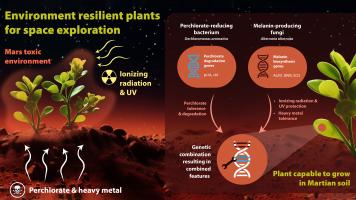The establishment of vegetation habitats, for on-site production of biomaterials and sustainable food production at ground space stations, is one of the biggest challenges for space exploration. High level of radiation, low temperature, low light intensity, low atmospheric pressure, low oxygen in the atmosphere as well as high level of toxic compounds in soil, are some of the most difficult hurdles to overcome in order to establish vegetation in space. Martian regolith contains high level of toxic compounds that are dangerous for both plants and human, including perchlorates and heavy metals. In order to address these environmental challenges the mechanisms for stress resistance will be introduced from environment resilient organisms into plants. The proposed activities will generate plants engineered with the perchlorate degradation pathway from Dechloromonas aromatica and the melanin biosynthesis pathway from the fungus Alternaria alternata, with the aim to produce plant lines that are able to withstand high concentrations of both perchlorate and heavy metal at levels similar to what is found in Martian regolith. In addition, expression of fungal melanin in these plants should also provide higher tolerance to ionizing radiation.


